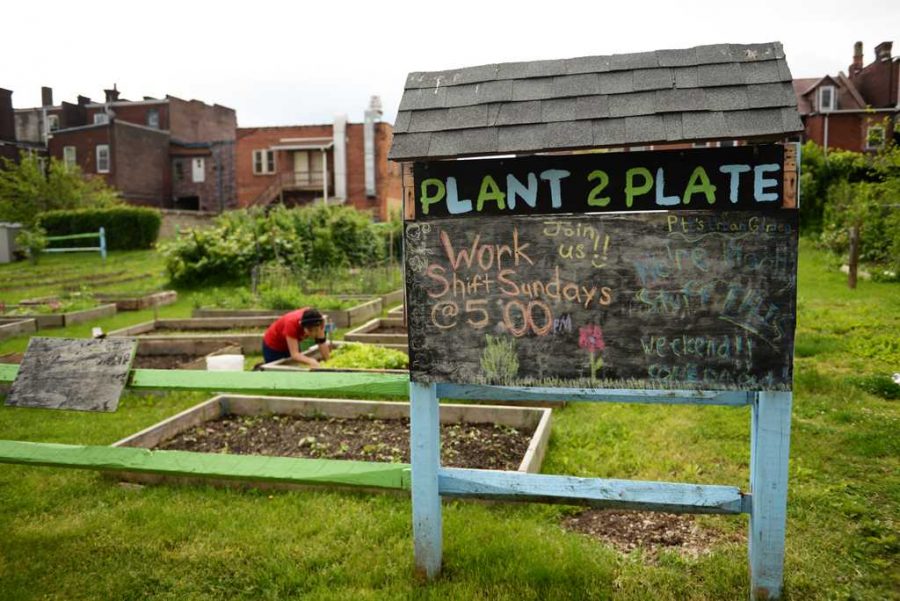About 400,000 people from thousands of organizations — dressed in vibrant costumes and wielding anti-fracking and clean energy signs — took to the streets of New York City demanding change at the 2014 People’s Climate March.
It was a energetic and impassioned call to action, and Pitt junior Alexandra Stash was in the middle of it.
At the time, Stash was a first-year biology major, but she said the march influenced her profoundly — she came back to Pitt with a new outlook on environmental justice.
“It was one of the most eye-opening events I [ever] experienced,” Stash, now the co-president of environmental group Free the Planet, said. “It made me realize that environmental activism and justice was my passion.”
Stash soon changed her major from biology to environmental science. Since then, she’s built a rain garden, spoken at rallies for the Clean Power Plan and helped Free the Planet start a fossil fuel divestment campaign.
In the movies, the environmentally conscious friend typically follows the “crunchy granola” trope: a new-age hippie, willing to go to humorous extremes to reduce their carbon footprint and save the planet — think Phoebe from early episodes of “Friends,” Chelsea from “That’s So Raven” or any number of characters on Fred Armisen and Carrie Brownstein’s “Portlandia.”
But in reality, Stash is one of many students on Pitt’s campus whose efforts to make Pitt greener have been far from comedic.
Pitt is one of the U.S. and Canada’s greenest universities, according to rankings by the Sierra Club and the Princeton Review.
Organizations including Free the Planet, Plant to Plate, Engineers for a Sustainable World and the Environmental Committee on the Student Government Board often collaborate on initiatives that have inspired serious policy change at Pitt.
Many of these groups run into each other, exchange ideas and come up with campaigns in the Student Office of Sustainability, room 510 of the William Pitt Union.
According to Erika Ninos, the Sustainability Program Coordinator at PittServes, SOOS is one of the best resources for anyone looking to start getting involved with sustainability.
“There, they will find information on student organizations and initiatives from FTP, Pitt’s oldest undergraduate environmental organization, to Plant to Plate, Pitt’s community garden group,” Ninos said.
The office houses plants basking in the sun from the windows and ESW’s soil-free gardening prototype. The walls are lined with posters calling for reducing fossil fuels, or advertising the farmer’s market and Pitt’s Green Team, a group that coordinates and encourages recycling in residence halls during new student move in.
Throughout the year, the Green Team also provides support to composting and recycling efforts across campus and organizes zero waste events, where everything — including plates and cutlery — is either biodegradable, compostable or recyclable.
According to Laura Zullo, senior manager of utilities and sustainability, Pitt recycles more than 40 percent of its waste stream. Much of this is due to the single stream recycling program, which allows students to place plastic, glass, metals and paper products in a single container, making recycling simpler and more visible.
In the 2016 RecycleMania tournament, a competition promoting waste reduction activities, Pitt recycled over 1 million pounds of material over eight weeks of competition.
Last year, ESW focused on four projects: an algae bioreactor that grows algae to convert into biofuels, a hydroponics system to grow plants without soil, expansions to a rain garden and a wind belt energy collection system. Additionally, the group held open workshops where students could create their own solar cellphone chargers.
Plant to Plate also tries to get students involved with its initiatives directly. The club holds weekly work shifts at its garden on Oakland Avenue and teaches students how to grow and cook their own food and how to pass the information on.
“We want to promote sustainable practices throughout the community,” said co-president Gerard Tessier, a junior mechanical engineering major.
While sustainability is becoming a trending issue at colleges throughout the country, Ninos said Pitt stands out for its campus-wide collaboration between students, student organizations, faculty and several administrative departments.
“Students have access to administrators, staff and faculty who want to work with them to explore and advance their ideas,” Ninos said.
Two years ago, Anna Greenberg, a junior environmental studies major and the sustainability program assistant through PittServes, was one of those students. She cofounded the University of Thriftsburgh, which opened March 2015.
Its goal is to cut down on clothing waste and bring awareness to the detrimental effects of the clothing industry. All revenue goes to Pitt Green Fund, which allocates money to clubs centered around sustainability.
Greenberg advises students to first bring their ideas to someone accessible, such as the Dean of Students, and work their way up the administration.
“Pitt is our university, and [administrators] want to see something happen,” Greenberg said. “If you have an idea and aren’t getting a response from the University, that doesn’t mean you should abandon it. Keep asking the University what to fix, and try again.”
A complete end to global warming, sustainable energy, cars that run on corn oil — they all sound like radical goals, but Greenberg said students are the arbiters of change.
“If there’s something you want to fix, there’s always a way to make it happen,” Greenberg said. “There are a lot of gaps where we could making more progress.”


